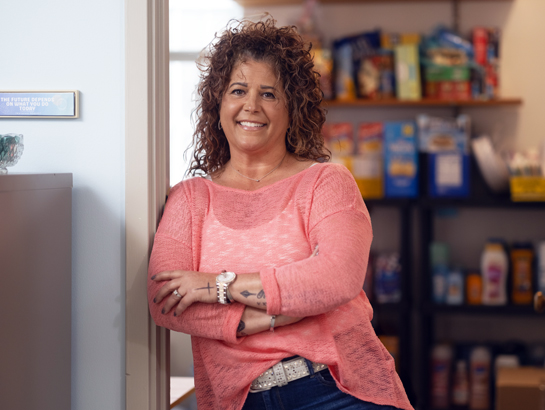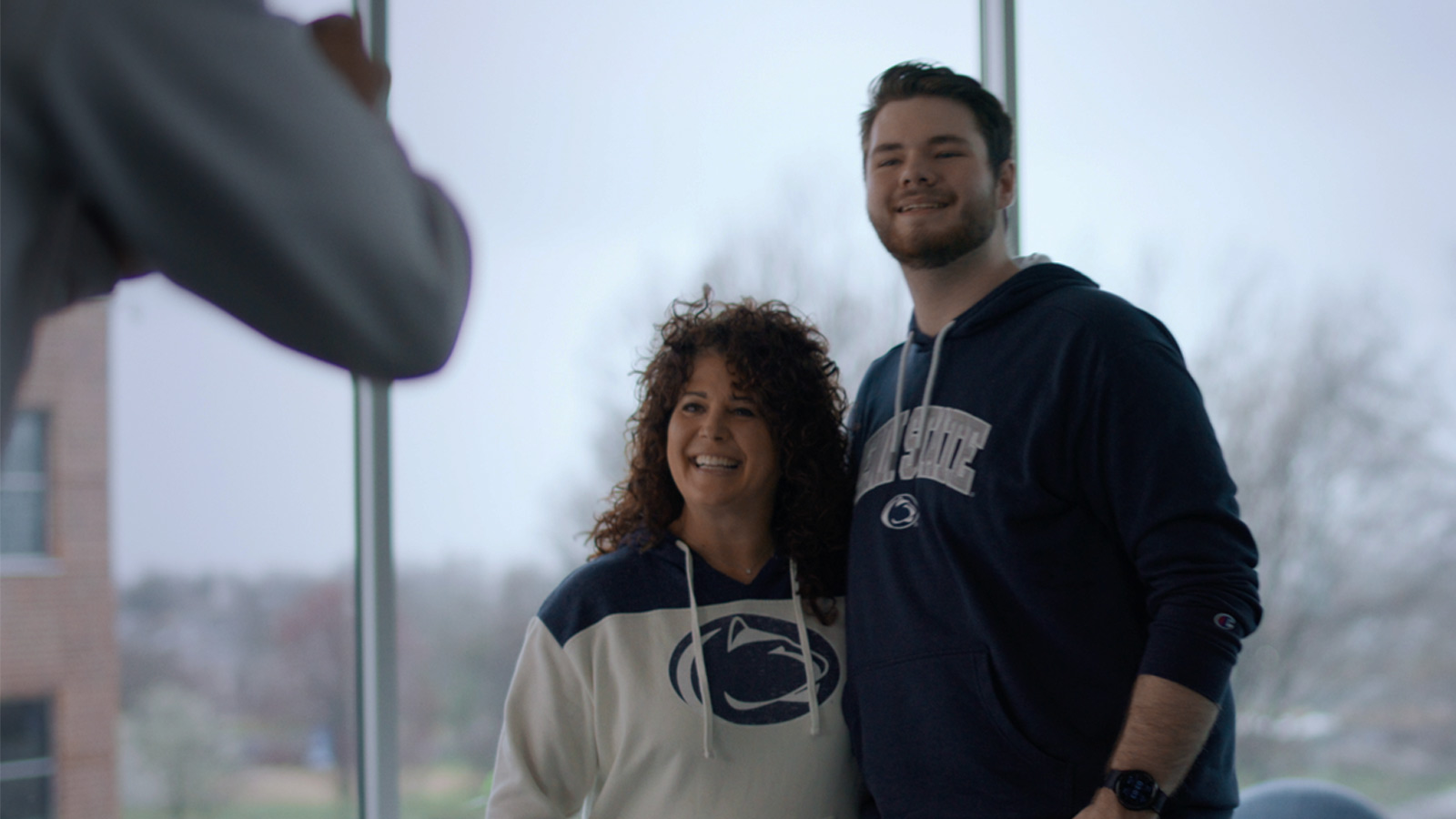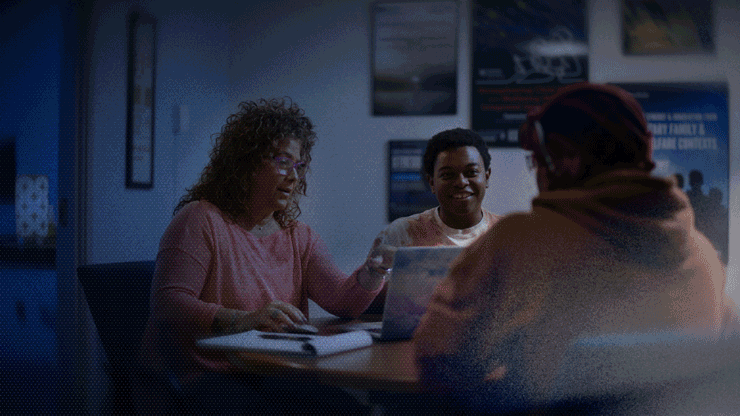For foster youths, graduating high school, let alone college, is an unlikely achievement.
According to the National Foster Youth Institute, only 50 percent of children in foster care finish high school. While nearly half of the foster youth population hope to earn a degree, fewer than 5 percent graduate from a four-year college.
Sometimes described as a ladder to economic mobility, access to higher education, particularly post-secondary education, often equates to economic independence and an improved quality of life.
The Fostering Lions Program at Penn State works to help foster youths graduate from college and succeed after graduation by connecting students with critical support resources. Complimenting Pennsylvania’s Fostering Independence Through Education Act, the program goes beyond the required postsecondary tuition waiver to offer personalized help for students who have been or are currently in foster care.

Cheri McConnell, Fostering Lions coach and education coordinator at the Child Maltreatment Solutions Network
The Fostering Lions Program works to improve postsecondary outcomes for foster youths through support in four key areas: financial, academic and career planning, social and emotional needs, and logistics.
WHY
Penn State provides opportunities for anyone willing to work hard and connects students with resources to succeed.
Fostering Lions is one of many support programs Penn State offers for economically disadvantaged students willing to put in the work, complete their degree, and push their lives forward.
Finding ‘Home’ at Penn State
Cheri McConnell was instrumental in launching the Fostering Lions Program in 2018, as part of the University’s Child Maltreatment Solutions Network. At the time, the program served only seven students. The program now supports nearly fifty students across the Commonwealth and, recently, celebrated its twentieth graduate.
In her role as “coach,” McConnell supports Penn State students who identify as foster youth with the various challenges they face while being in college. Sometimes, the most daunting hurdle for students is believing that success is possible.
Students in the Fostering Lions Program may face hardships beyond tuition costs. McConnell’s office looks like a big-box store, overflowing with paper towels, bed sheets, and boxes of oatmeal that she gives to her students to meet basic needs. From helping them shop for clothing appropriate for interviews to installing new tires on a car for the commute to class, McConnell knows that there are numerous factors at play for students who lack life skills and family guidance.
“Penn State takes a holistic approach to provide students with whatever they may need, including emotional and mental health support. I am here to alleviate the stress of the day-to-day, so all they have to do is focus on school,” said McConnell.
McConnell makes it a priority to visit Fostering Lions students at each Penn State campus every semester. She tracks the students’ academic progress and connects them with financial resources, academic and career planning, logistics, and, most importantly, an advocate.
“I want every student to find belonging at Penn State,” said McConnell. “I personally connect with every Fostering Lions student to build trust—they are more than just a student to me.”
As the Fostering Lions Program continues to champion current students, they look to the future as the Child Maltreatment Solutions Network explores new research opportunities—looking at student success rates, retention, societal contributions, and other factors. This research will help raise awareness and hopefully, secure additional funding to grow the program.
“I am here to alleviate the stress of the day-to-day, so all they have to do is focus on school.”

FAFSA Box 52
When filling out the Free Application for Federal Student Aid (FAFSA) form, Penn State York student Charlie Keller-Golden was struck by box 52—he still remembers the number—the box you check if you’re an orphan, foster youth, or ward of the court.
“When you check the box stating you’ve been in the foster care system, Penn State relays this information, and Cheri invited me to the program before school even started.”
For Keller-Golden, the Fostering Lions Program is like having a second home.
“Cheri and the Fostering Lions Program always has my back. She really cares about everyone in the program and is always trying to do whatever she can for you,” Keller-Golden said. “Plus, the small campus community and personal attention from my professors has made life a lot easier.”
Keller-Golden is now a second-year student at Penn State York, majoring in cybersecurity analytics and operations with a minor in business. (His goal: help NASA develop cybersecurity for its space systems, including securing satellites and safeguarding data.) But, due to life circumstances, college and, specifically Penn State, weren’t on his radar.
As a high school student in Texas, Keller-Golden built his own computer just for the challenge of it and loved playing online video games, which is how he met his best friend from Pennsylvania. His world abruptly turned upside down in 2020, when he became an orphan.
Despite Keller-Golden’s intelligence and work ethic, college seemed like an unattainable dream—until his best friend’s family reached out. The family had flown Keller-Golden to Pennsylvania a few years prior as a special gift—a chance for the best friends to meet in person. From this one in-person interaction with Keller-Golden, the family could tell there was something special about him. When tragedy struck Keller-Golden in 2020, without hesitation, the family took him in as their foster child and vowed to help him through college.
“Cheri and the Fostering Lions Program always has my back. She really cares about everyone in the program and is always trying to do whatever she can for you.”
The Freedom to Succeed
Keller-Golden, who already has accepted a job offer for after he graduates, knows he wouldn’t be who he is today if he hadn’t gone through difficult situations earlier in his life.
“I wear my heart on my sleeve,” said Keller-Golden. “Acknowledging where I’ve come from allows me to move forward and become stronger despite it. I want to prove to everybody that a kid who came from a very underprivileged background, who went through a lot of trauma early in life, can do better and succeed. College is how you break that cycle. That’s how you become free.”
With tears in her eyes, McConnell explains that what motivates her is seeing students like Keller-Golden through the successes and inevitable challenges.
“I am driven by helping my students define success. When I see that they have a path and a direction, then that’s success to me.”



